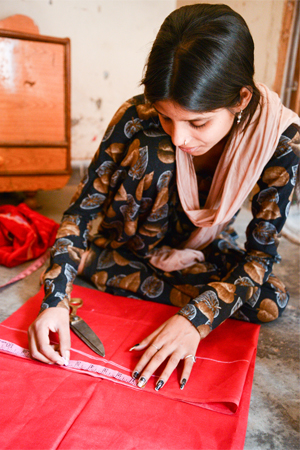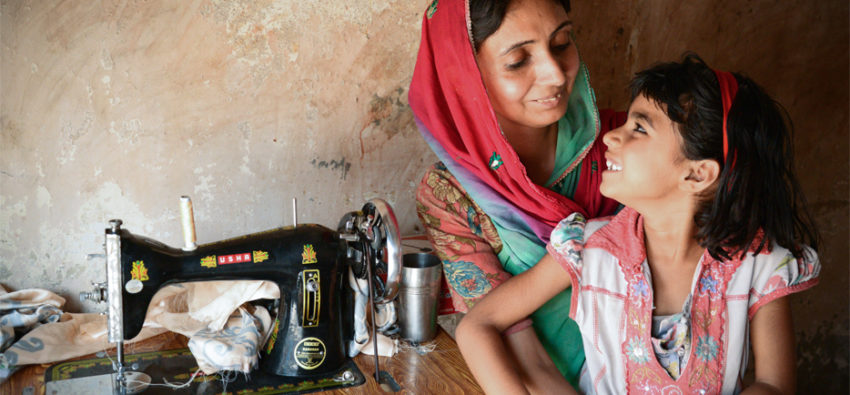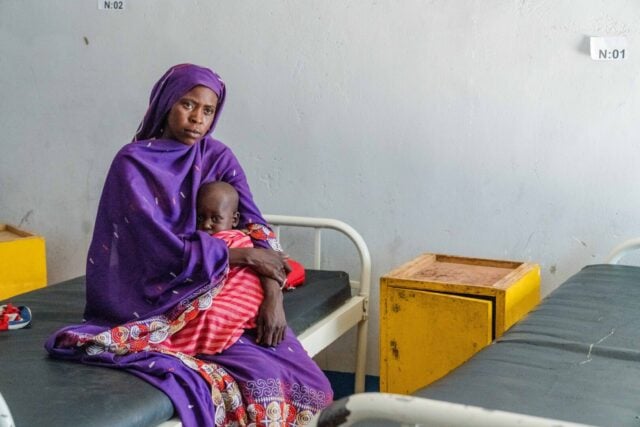In India, there is a long-standing tradition that women serve men and maintain the home. Many drop out of school; some never venture outside their homes at all.
Through World Vision training programs, women like Jyoti and Khadija receive training in tailoring as well as sewing machines, empowering them to open their own tailor shops and inspire the next generation.
* * *
The iron shutters of Jyoti’s tailoring shop rattle as they open. She starts her daily ritual by sweeping up the strips of cloth and thread left behind after yesterday’s stitching.
A few kilometers away, Khadija sends her children off to school and starts work. Paddling swiftly with her feet, the sole energy source of her sewing machine, she sets the pace of the needle etching a pattern on the cloth.
For these high school drop-outs, their professional lives began the day they defied the norms of society and picked up a reel of thread.
Deep in poverty, Khadija’s father was unable to support a family of nine, leading to her dropping out of school in grade 7.
“I had the dream of becoming a doctor, but my father could not afford paying school fees, so we dropped out,” says Khadija.
The stereotypical role of a woman — cleaning, cooking, caring for the young — was entrusted to her. She begged her father to let her study, but at 18, she was married off.
Her desire to stand on her own vanished. When her husband’s business failed, the family plunged into debt. With limited resources, she fell prey to a daunting dilemma — education or survival.
For Jyoti, who dropped out of school in eighth grade, having her own tailoring store was never an option. After her father’s accident, the family’s reserves hit an all-time low, and Jyoti, at age 15, relinquished her education to work.

“My sibling’s education, food, and clothes all required money. My father was unable to do his egg business, so I stepped in. From 9 a.m. to 8 p.m., I worked in the car upholstery factory. Education became the least of my priorities,” says Jyoti, now 18.
Both Khadija and Jyoti struggled to keep pace with the expectations of society. But liberation came in the form of a stitch in time.
“The number of school drop-outs and unemployed youth was alarming when we first started work,” says Harish Chand, a project manager for World Vision in India. “We decided to conduct vocational courses for girls. Tailoring classes and beautician courses were the most valued. Many were also sent for English-speaking courses so they could find work in retail stores.”
World Vision staff motivated families to send wives and daughters for classes. Khadija and Jyoti were two out of 198 women who received basic training in tailoring. For many, it was their first exposure outside the solitary confinement of their homes.
For Jyoti, it was a breakaway moment from the long-hour shifts at the factory.
“Having one’s own business is a different experience. My schedule is not strenuous like my previous job,” she says. “And being my own boss is liberating. Now I do work at my convenience and earn a profit. The desire in my heart to open my own store has finally been fulfilled through World Vision.”
With a radiant glow on her face, Jyoti says, “I am not less than any fashion designer. Ask me to make any design or outfit, I will make it. I carry this skill and confidence with me wherever I go.”
For Khadija, she crossed the threshold of her home for the first time, shattering the norm that society had imprinted on women. The classes came as a saving grace. Khadija reminisces about her giant leap of faith.
“The first day of class, I saw many women. It was very encouraging. I made a lot of friends. At the end, to start my career, World Vision gave me three sewing machines,” she says. “The greatest blessing is that I can stand up on my own two feet now. I have a feeling of pride in me, that I am not dependent on anyone anymore. I am able to take care of my family better and focus more on my children’s well-being. My husband is proud of me.”
Taking a break from her boutique adjacent to her home, Khadija switches back to the role of mother as her children return from school. Teaching her four children to dream big, Khadija vows to educate and empower them to be what they want to be.
Owing her competence to World Vision, Khadija has made it her mission to motivate others through the power of a stitch.
Jyoti shares a similar vision. In the evenings, her shop turns into a training center for young girls.
“The girls I teach get the opportunity to come out of their homes, and I hope someday they will work too. In our community, the attitude toward women working is poor. People talk about women being someone else’s property but fail to realize that women are the bearers of life. Without women, the world will not grow. Through this skill, we are helping women to stand up on their own feet. My hope is that these girls become more confident and empowered,” says Jyoti.
Attending to her business has also sparked an interest in education. Jyoti is looking for options along with World Vision to get back to studying.
“With education, I can achieve greater things in life,” she says.
Like yarn that has different compositions but serves one purpose, Jyoti, Khadija, and others like them come from different backgrounds but intertwine to constitute one perfect ensemble: the garment of empowerment.
In addition to life-saving basics like clean water, nutritious food, and healthcare, child sponsorship helps provide training programs and education for women and girls. Consider sponsoring a girl in India today.



Comments